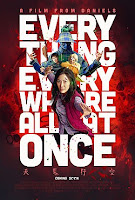If there was a roller-coaster in an existential amusement park, that left you with not just the thrill of the experience, but also with enough neuro-synapses in the brain, that point to some answers to navigate our current personal and societal world-life crisis, that ride would be called #everythingeverywhereallatonce
Delivered through multi-metaphors, multi-verses, multi-madness, multi-emotions, multi-characters, multi-generations, and multi-relationships, this multi-Oscar-winning masterpiece is a fitting reflection of our complex, absurd, what-the-hell-is-going-on-in-the-world world. It’s a fitting title for the movie, because, unlike many other films, this one doesn’t choose just one or two aspects of our lives, but puts the ambition of dealing with everything everywhere all at once, issues of our times. Climate change, war, conflicts, displacements, marital ennui, feminism, parenting, inclusion, equality, migrant culture, youth isolation & loneliness, the meaning of life, generational emotional traps… did I miss anything!
And that’s the reason the film takes this mad exaggerated mind-numbing fantastical story-telling.
Because one has to be completely crazy to tell this story.
Because it’s the story of our lives, right here, right now.
Because we all know it, we all feel it, every day….
The mesmerizing voice of Seal, playing in my head “We’re never gonna survive unless we get a little Crazy”
The story revolves around Evelyn Quan (Oscar-winning performance by Michelle Yeoh), running a laundromat with her husband, Waymond (Ke Huy Quan), living with an ailing-but-patronizing father, Gong Gong (James Hong), and daughter Joy (Stephanie Hsu), being audited and harassed by the IRS, led by agent Dierdre (Oscar-winning performance by Jamie Lee Curtis). When a meeting at the IRS office, triggers an opening of the multi-verse, Waymond from the Alpha-verse finds Evelyn, connecting her to the multi-verse, enabling her to lead the fight against the gone-rouge daughter Jobu Topaki (aka Joy) and simultaneously against her own side led by the Alpha verse’s Gong Gong (her father). Moving between the different universes, the worlds, and the people collide, fighting the battle for hope, for redemption, and for oblivion.
Straddling between the many many multi-verses and the many many versions and lives of Evelyn and Waymond and Joy and Diedre (including one, where Joy and Evelyn are just rocks.. literally!), we see on one side, the despair, the frustration, the futility, the irrelevance, the dystopian reality of our lives, represented by Jobu Topaki/Joy. On the other side, we see the hopeless romanticism, the naive belief in a better world, the quiet rebellion of goodness, and the inner strength of Waymond. “When I choose to see the good side of things, I’m not being naive. It is strategic and necessary. It’s how I’ve learned to survive through everything.” And caught between, we see the desperate stuck-ness, the chaos, the loneliness, the helplessness, the nothingness, the regrets, the quiet resentment of choices of the past that continue to define the present, the anger at a male-dominated and un-inclusive world that we don’t even notice anymore, shown through Evelyn.
Through the eyes of Evelyn, we see the world as it is, but as the story evolves through its mad narrative, we also begin to see the world as it could be. And the narrative surprisingly moves us from despair to hope. The turning point comes from the most unexpected place and when we least expect it. In the middle of what seems to be the end of it all, Waymond cries out loud “The only thing I do know is that we have to be kind. Please. Be kind, especially when we don’t know what’s going on”. The impact of this is instantly felt, in the film, but also by the viewer. We ask ourselves, could the answer really be as simple as that? This, then, finally sets the tone for what follows in the film, towards a final conclusion.
A powerful film, delivered by powerful performances.
A tome of our times.
An Insanity
A Catharsis.
A Humanity.
#EverythingEverywhereAllAtOnce
Even though Jobu Topaki tries to convince us that “Nothing Matters”, because in the end, we’re all dead.
In our hearts, we know that “Everything Matters”, precisely because in the end, we’re all dead.
The question is, do they make it in end, in the film?
And also, Will we make it, in our world and in our lives?
I go back to what Waymond says in the film
“Most people only have a few significant alternate life paths so close to them. But you, here, you’re capable of anything because you’re so bad at everything”.
